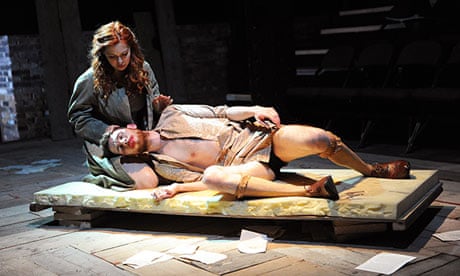It's that man again: Bertolt Brecht. His early play, In the Jungle of Cities, is being revived at London's Arcola, and later this month he's back in the West End, as Jonathan Church's Chichester production of The Resistible Rise of Arturo Ui moves to the Duchess. It's a production that won lots of praise when first seen last year, not least for the comic demonism of Henry Goodman's performance as the eponymous Chicago racketeer who provides a metaphor for Adolf Hitler. But, for all its dazzling energy, I suspect the production will raise all the old arguments about Brecht's standing today. Is he still an irresistible force or simply a chapter in theatrical history whose reputation has declined with the collapse of eastern European communism?
In weighing up the pros and cons, one has to start with a basic fact: as both a practising dramatist and visionary theorist, Brecht changed the face of modern theatre. Just to take Britain alone, I'd argue that the historic visit by Brecht's Berliner Ensemble to London in 1956 did more than any other single event – even than the premiere of Waiting for Godot a year earlier – to shake us out of our rooted complacency. The spare Brechtian aesthetic had a profound influence on the newly founded English Stage Company at the Royal Court, and the realisation of what a permanent company could achieve shaped the creation of the Royal Shakespeare Company in 1960 and the National theatre in 1963.
Directors, designers and dramatists were all influenced by Brecht's idea of an epic theatre in which narrative replaces plot, the spectator is turned into an observer rather than someone implicated in the stage action, and each scene exists for itself alone. Above all, Brecht's belief that drama should present moral and political ideas through action left its stamp on a huge range of plays, from Serjeant Musgrave's Dance by John Arden, Luther by John Osborne and Saved by Edward Bond in the 1950s and 60s, through to Fanshen by David Hare and Destiny by David Edgar in the 1970s. As David Edgar once said: "Brecht is part of the air we breathe."

Lest you think I exaggerate Brecht's influence, I turned up a catalogue to an exhibition, Bertolt Brecht in Britain, mounted at the National Theatre in 1977. Among other things, it includes a checklist of annual productions. In 1972 you find 15 professional Brecht productions in the UK ranging from Arturo Ui in Belfast and Bradford to Mother Courage and Her Children in Watford and Canterbury, and a West End revival of The Threepenny Opera with a cast that included Vanessa Redgrave and Barbara Windsor. There were 77 amateur productions including a staggering 36 – many staged by students – of The Caucasian Chalk Circle. For good measure, BBC Television also presented Arturo Ui starring the formidable Nicol Williamson.
All this is unimaginable today. Few regional theatres have the financial resources, even if they had the will, to mount a Brecht play. The right-wing thought police would, I suspect, quickly be on the case if any school put on a Brecht show. And there is about as much likelihood of BBC doing a prestigious Brecht television production as there is of it presenting a play by Sophocles, Shaw, Ibsen, Chekhov or any of the great classic dramatists. Even in academia Brecht is much less central than he used to be: a friend told me that a supposedly comprehensive undergraduate theatre course devotes roughly two hours a year to him.
Yet, even if Brecht is out of fashion, his legacy is all around us. Stephen Unwin, in his excellent A Guide to the Plays of Bertolt Brecht, points to one key example in the growth of documentary drama. The kind of work staged at London's Tricycle theatre under Nicolas Kent, starting with Half the Picture in 1993 and taking us up to Gillian Slovo's examination of the London riots in 2011, fulfilled many of Brecht's theatrical criteria. This was work that, in Brecht's definition of epic theatre, offered the spectator a picture of the world, forced him or her to take decisions. It appealed to reason rather than feeling. Even the performance style made it clear that actors were representing, rather than identifying with, particular characters.

I also sense the Brechtian influence at work in some of the big plays on public themes that have emerged in recent years. They may eschew the Brechtian visual approach, but they engage with the issues of our times in ways he would have understood. In Enron (2009), Lucy Prebble traced the fall of the Texan energy giant to show how capitalism depends on con-tricks and illusions. In 13 (2011), which many critics myopically repudiated, Mike Bartlett argued that popular protest was now a bigger force for change than entrenched political parties. And in the 2013 play Chimerica, Lucy Kirkwood boldly invites us to compare and contrast China and America: it is a work that genuinely activates thought in that its apparent conclusion that America tolerates dissent while China punishes it is brought into question by the cases of Bradley Manning and Edward Snowden.
Brecht may be out of fashion in the self-regarding world of immersive and site-specific theatre, where everything depends on the minor shocks and sensations felt by the individual spectator: however good such shows may be, you generally come out of one by Punchdrunk or Shunt wanting to change your clothes instead of the world. But Brecth's legacy is still too pervasive and potent for him ever to be entirely invisible.
We are also learning how to do him without the pedagogic reverence that for years put people off. Jonathan Church's excellent Arturo Ui ushers us into a Chicago speakeasy where we listen to the seductive sounds of a jazz trio. And Roxana Silbert's modern-dress Royal Shakespeare Company production of A Life of Galileo earlier this year used a text sensibly trimmed by Mark Ravenhill and seemed vitally connected to a world in which a liberally intentioned pope found himself trapped by institutional conservatism.
Brecht is too big a force to ignore. One of his prime assets is that he wrote great parts for actors. Recently, I happened to mention to Alexei Sayle that he would be a natural to play Azdak, the justice-dispensing village rogue in The Caucasian Chalk Circle, and his eyes lit up at the prospect: an antipodean Brecht scholar, incidentally, has pointed out to me that the near-hanging of Azdak is a direct reference to Nanki-Poo in the Mikado and that Brecht, as a great admirer of Gilbert and Sullivan, toyed with doing his own version of HMS Pinafore!
But I'd like see our theatre go beyond revivals of Galileo, Mother Courage, The Caucasian Chalk Circle and The Good Person of Szechwan. I'd be fascinated to see St Joan of the Stockyards, with its Salvation Army heroine, Paul Dessau choruses and parodies of Goethe and Schiller. Brecht may not be as fashionable as he once was. But, in a theatre that tends towards narcissistic introspection, his ability to engage with the world and instruct delightfully seems to me more urgently important than ever.

Comments (…)
Sign in or create your Guardian account to join the discussion